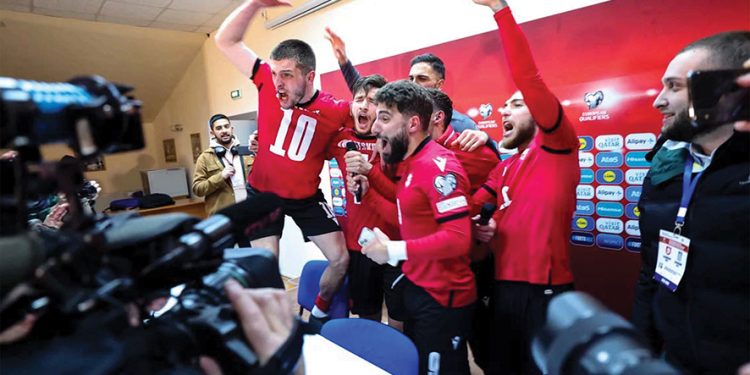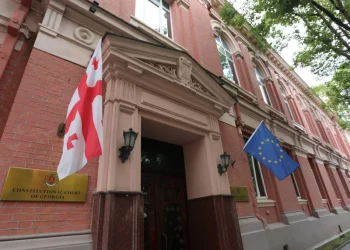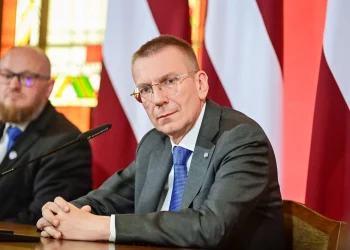It’s been a long time coming. But, courtesy of a dramatic penalty shootout triumph over Greece at a jam-packed Boris Paichadze Stadium on March 26, Georgia’s national football team will compete at a major international tournament for the first time ever this summer.
Let it sink in: The Georgians are going to Euro 2024 in Germany!
With the clock nearing midnight on a chilly and tense night in Tbilisi, Nika Kvekveskiri stepped up to score the winning penalty, sending a whole nation into a frenzy of happiness.
On the terraces, strangers embraced like lifelong friends, and fully grown adults cried tears of joy. The long-suffering Georgian fans finally had their moment, and euphoria swept across the stadium.
Jubilant supporters couldn’t be contained, as they poured onto the hallowed turf. Within minutes, the equivalent of the population of Bolnisi had descended onto the grass to adore their heroes and soak up an achievement Georgian football had been craving for many generations.
And, of course, the ecstasy was not confined to the stadium. Throughout the whole country, from the vineyards of Kakheti to the sparkling Adjaran coastline and everywhere in between, there were scenes of unprecedented delirium.
Even those without the faintest interest in football leapt, cheered, and hugged whoever was close by, as Georgia made history.
Alongside Ukraine and Poland, who also won their play-off finals, a place at the European Championships is theirs. But while there’s much to anticipate in the near future, to understand the significance of Georgia’s victory and the joyous bedlam that ensued, it is necessary to first look back.
Georgians made their mark on international football long before the country first played as an independent country in the early 1990s.
Indeed, in 1960, three Georgians – Givi Chokheli, Mikheil Meskhi, and Slava Metreveli – all played in the first-ever European Championships final, albeit representing the Soviet Union, who defeated Yugoslavia 2-1 in Paris.
Twelve years later, Revaz Dzodzuashvili and Murtaz Khurtsilava were on the losing side against West Germany in the Euro 1972 final in Brussels, and in the 1982 World Cup in Spain, a formidable Georgian contingent, including captain Aleksandr Chivadze and Ramaz Shengelia, helped the USSR to knock out a much-fancied Scotland side in the group stage.
At club level, the glories of Dinamo Tbilisi (which in the Soviet era was effectively considered the Georgian national team) in the late 1970s and early 1980s drew global admiration.
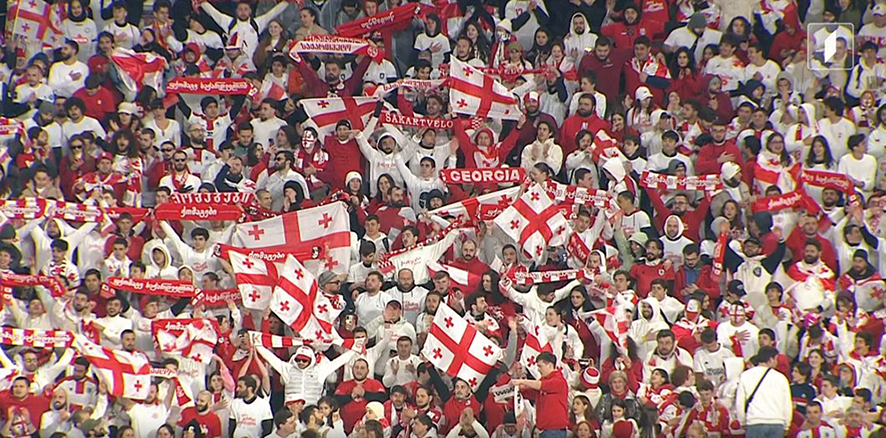
However, since gaining independence, the Georgian national side has generally toiled to recapture such magic. Sure, there have been stars – sublime dribbler Giorgi Kinkladze is still revered at Manchester City for his winding runs around Maine Road in the 1990s, potent goal-scorer Shota Arveladze was much loved in Turkey, Holland, and Scotland in the late 1990s and 2000s, while Kakha Kaladze won it all at AC Milan – but success as a national team had evaded the Georgians. Certainly, qualification for a major tournament had seldom been in the realms of the conceivable.
Until this week, whenever the topic of conversation at a Georgian supra turned to football, fathers, uncles, grandfathers, and great grandfathers would talk fondly of these great Georgian players of a bygone age, never to return.
But now, the Georgian kids of today have their own generation of idols to tell their offspring about as the barbecue sizzles and the wine flows in the decades ahead.
Returning to the present, or at least the near present, Georgia – under French head coach Willy Sagnol – had secured a place in the play-off final against Greece after a reasonably comfortable 2-0 success against Luxembourg the previous Thursday on a soaking wet night, thanks to Budu Zivzivadze’s double.
But reaching such a final was not unprecedented for Georgia. Back in November 2020, with the COVID-19 pandemic at its fearsome height and a nationwide curfew imposed, the Georgians were in the same situation.
In an eerily empty Boris Paichadze Stadium, Georgian fans, restricted to their living rooms, watched in horror as North Macedonia emerged as 1-0 victors to take their spot at Euro 2020.
A haunting failure, and the chance of a lifetime spurned – or so many of us thought.
Fast forward three-and-a-half years, and the mood was quite different – a sellout crowd in raucous mood provided a cacophonous atmosphere. If Georgia were going to fall short against Greece, it wasn’t going to be for a lack of support.
Long before kick-off, supporters packed the stands, with songs reverberating round the famed arena. Their faith in this Georgian team was palpable, maybe even infectious.
They were also buoyed by the return of Napoli superstar Khvicha Kvaratskhelia, perhaps Georgia’s first world-class player in the post-independence era, who had been suspended for the Luxembourg semi-final.
After a booming rendition of the national anthem, the time had come for Georgia to make history. However, it soon became apparent that this would be no stroll for the hosts. As a tense game wore on without much incident, Greece, though a pale shadow of the storied team that won the European Championships 20 years ago, were proving a stubborn opponent.
On the rare occasions Kvaratskhelia got on the ball, there were shrieks of anticipation from the home fans, only for him to be quickly subdued by the circling Greeks – sometimes fairly, sometimes not.
In a poor but somehow gripping opening 45 minutes, passes from both sides went astray, and neither goalkeeper was seriously troubled – with the exception of Giorgi Chakvetadze’s free-kick forcing Greek number one Odysseas Vlachodimos into a smart tip over the bar towards the first half’s end.
Into the second half, and the script stayed much the same, with tension overcoming talent, and two hard-working teams cancelling each other out.
As the minutes passed, the hesitancy to take the risk of making a mistake grew and grew.
Nerves jangling around the country, we proceeded to extra time, where genuine chances finally did emerge.
The first two of those fell to the visitors, when in the 100th minute, a deflected shot from Anastasios Bakasetas produced an agile low save from Georgian goalkeeper Giorgi Mamardashvili.
Soon after, Mamardashvili was beaten by a towering header from Konstantinos Mavropanos, which rattled the home crossbar.
Suddenly under threat, the Georgians rallied with Zurab Davitashvili’s shot then denied by the legs of Vlachodimos.
In the second half of extra time, an enterprising run from Georgiy Tsitaishvili had the home fans ready to roar, only for his shot from a narrow angle to be turned behind by the resolute Vlachodimos.
As the Polish referee sounded the whistle for full time, the football was over, and the theatre of penalty kicks awaited.
Supporters didn’t know where to look. Many prayed, while others broke into chant and song.
Less than a year ago, Georgia’s under-21s had suffered an agonizing penalty shootout loss to Israel in the very same stadium, memories of which were still raw among fans and some of the players alike.
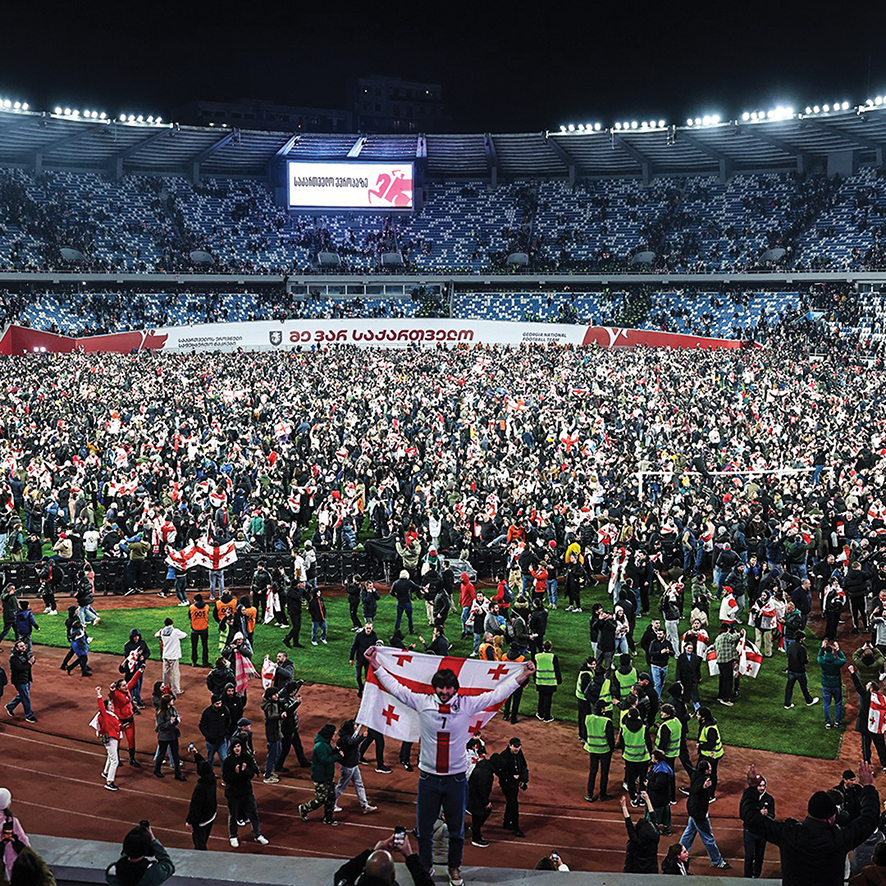
But something felt different this time – no more heroic defeat: Victory was within reach.
Georgia were up first, as Giorgi Kochorashvili, following a long and surely uncomfortable wait, dispatched an unstoppable strike into the top corner, triggering a mixture of elation and relief in the home support.
Attention now turned to Mamardashvili, the Georgian goalkeeper, who superbly thwarted the penalty of Bakasetas, sending the stadium into raptures. First blood: Georgia.
Youngster Zuriko Davitashvili then rolled in Georgia’s second penalty, edging them closer to the holy grail of the Euros.
However, the Georgians’ readiness to celebrate was then tempered when Giorgos Masouras expertly converted to bring it back to 2-1.
The previously uproarious vibe among the Georgians was then muted further when Giorgi Mikautadze side-footed his effort wide of target, to the sound of 50,000 groans.
Andreas Bouchalakis then levelled for the Greeks, making it 2-2.
Now fearing the worst, the home fans breathed a collective sigh of relief when Lasha Dvali bravely tucked away his penalty, after which Greek striker Giorgos Giakoumakis dragged his spot-kick to the left of Mamardashvili’s goal.
This was it. Georgia were now one kick away from the big stage they longed for.
The realization seeped in around the ground that history beckoned and fans bounced with anticipation. And Kvekveskiri made no mistake as the ball rippled the net, triggering countrywide mayhem.
The subsequent (peaceful) pitch invasion produced images that will no doubt be stitched into the collective Georgian memory for decades.
At the Euros, Georgia will face Turkey, the Czech Republic, and Portugal, and fans are already plotting to follow their heroes in Germany this summer by whatever means necessary.
Between now and then, such is the power of football, it is likely the sense of togetherness and universal celebration across the country will linger. Let’s hope so, anyway.
Altogether now: Saqartvelos gaumar…
By Alastair Watt

